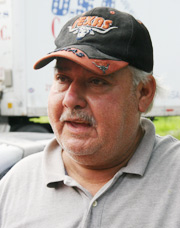Posted: 8/08/07
Explore the Bible Series for August 19
Living in covenant relationship
• Malachi 2:1-16
By Kathryn Aragon
First Baptist Church, Duncanville
There is no greater bond than covenant relationship. Although we see many depictions of this relationship throughout the Old Testament, none is greater than the covenant of salvation.
Covenant signifies agreement. In the case of salvation, this means we agree with God about our sinful nature and our inability to live up to God’s standard of perfection. Having agreed with God, we enter into Jesus’ death, allowing his blood to wash away the sins of the “old man” while giving life to the “new man.”
This covenant is made at God’s expense. The debt of sin, which is far too heavy for us to carry, is removed. But it was meant to be replaced by a debt that is no burden at all, that of thankfulness, reverence and awe. “This is the covenant I will make with the house of Israel after that time, declares the Lord. I will put my laws in their minds and write them on their hearts. I will be their God, and they will be my people” (Hebrews 8:10).
Jesus’ invitation, then, is to covenant relationship: “Come to me, all you who are weary and burdened, and I will give you rest. Take my yoke upon you and learn from me … . For my yoke is easy and my burden is light” (Matthew 11:28-30).
Covenant relationship is binding
When Jesus died on the cross, the veil in the temple, separating us from the Holy of Holies, was torn in two. Through this, God signified we would no longer need an earthly high priest. Instead, Jesus is the High Priest who mediates for us with God. It also signifies each of us can enter a priestly role, relating to God personally and individually.
“Therefore, brothers, since we have confidence to enter the Most Holy Place by the blood of Jesus, by a new and living way opened for us through the curtain, that is, his body, and since we have a great priest over the house of God, let us draw near to God with a sincere heart in full assurance of faith, having our hearts sprinkled to cleanse us from a guilty conscience” (Hebrews 10:19-22).
God’s plan is perfect. Unfortunately, we aren’t. How easy it is to enter God’s grace, give a sigh of relief, and then fail to draw near to God. Or fail to love God sincerely. How easy it is to continue in our sin, turning our backs on our covenant with God. “If we deliberately keep on sinning after we have received the knowledge of the truth, no sacrifice for sins is left” (Hebrews 10: 26).
Is it any wonder God is offended? He made the perfect plan, waited patiently for the fullness of time, and sacrificed his own Son, Jesus. He offers a “covenant of life and peace.” Our response should be awe. How can it be that the majestic God of all creation, whose throne is heaven and whose footstool is earth, should favor us with his love. Yet in his perfection, he can’t help himself. God is love, after all.
In speaking of his covenant with Levi, God says, “My covenant was with him, a covenant of life and peace, and I gave them to him; this called for reverence and he revered me and stood in awe of my name. True instruction was in his mouth and nothing false was found on his lips. He walked with me in peace and uprightness, and turned many from sin” (v. 5-6). God already has given us life and peace. We are bound to give God reverence.
Covenant relationship is eternal
The most wonderful thing about salvation is the magnitude of the gift. It gives us life and peace not only in this world, but for eternity. However, since the blessings of covenant relationship last forever, the consequences of ignoring covenant requirements also must be eternal.
When we fail to give God the reverence he deserves, we cheat God. Having accepted his grace in salvation, we now are in his debt. Of course, God intends the debt to be light. He only asks that we repay him with thankfulness and obedience. Unfortunately, because of the nature of covenants, when we fail to perform our part of the covenant, Malachi says we bring curses upon ourselves.
Not only does disregard for God bring curses on us individually, it also brings curses on our descendants. When God gave Moses the Ten Commandments, he told him, “I, the Lord your God, am a jealous God, punishing the children for the sin of the fathers to the third and fourth generation of those who hate me, but showing love to a thousand generations of those who love me and keep my commandments” (Exodus 20:5).
Although we don’t like to think about God in the same sentence with curses, we can’t deny what God says. There are consequences for not honoring him. We can, however, take comfort in the fact that God’s blessings far outweigh his curses. Notice the curses will affect our children, grandchildren and even our great-grandchildren. Now notice how many of our descendants will be blessed by our commitment to covenant relationship with God. God prefers to bless us, but sometimes he must resort to drastic measures to get our attention. Cursing our blessings is just that: a drastic measure meant to discipline his children.
Because each of us has access to God, just as the priests did in the time of Malachi, God’s rebuke applies to us. “For the lips of a priest ought to preserve knowledge, and from his mouth men should seek instruction” (v. 7).
Yet we can’t preserve something we don’t have. Covenant relationship means we must know God, and we can know him only if we spend time with him. We must commit to learning God’s heart through prayer and reading the Bible. As the Psalmist writes, “Blessed are they whose ways are blameless, who walk according to the law of the Lord” (Psalm 119:1).
We must learn to stay focused on the generous gift of covenant relationship and show our thanks to God by honoring and reverencing him. Malachi reminds us disobedience brings curses on our blessings. But how much more will the God of love bless our curses if we turn to him with our whole hearts? “‘I have sent you this admonition so that my covenant with Levi may continue,’ says the Lord Almighty” (v. 4). Let’s step into the fullness of covenant relationship, and let’s step into blessing.
Discussion questions
• Why is it difficult for us to reverence God as he deserves?
• What does it mean to have “true instruction” in our mouths?
• Can we do this without seeming too dogmatic?
• Does being saved protect us from God’s anger?
News of religion, faith, missions, Bible study and Christian ministry among Baptist churches, in Texas, the BGCT, the nation and around the world.






